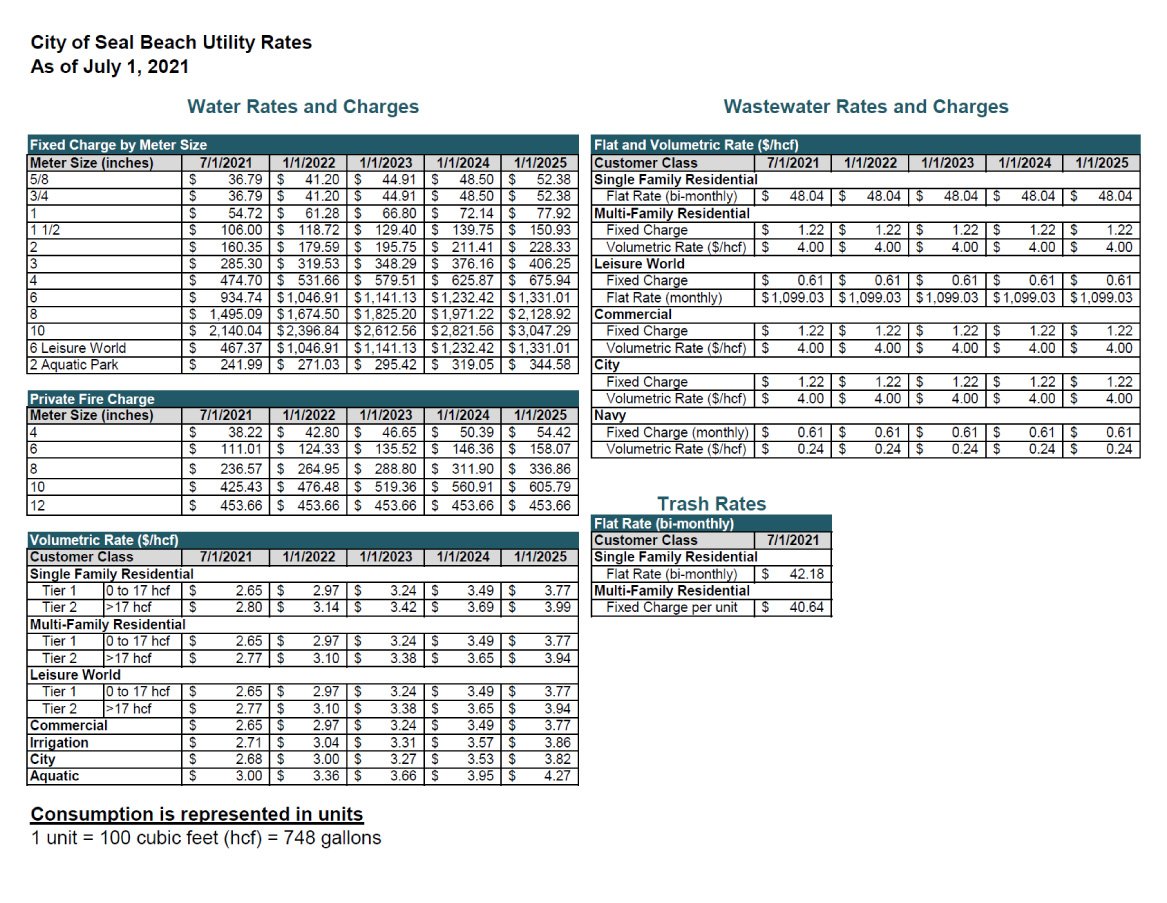
Investing
In Our Future
The City of Seal Beach provides clean water and wastewater collection to homes and businesses, schools and medical facilities, parks and libraries, and the list goes on. Our water and wastewater (sewer) services support our city’s health and economy while protecting the environment. To keep pace with inflation and rising costs of providing safe, reliable water and sewer services, the City is conducting financial planning and utility rate study of its water and sewer services. Customer service rates and charges help fund operations, maintenance, and critical capital investments.
Our Goal
The goal of the rate study is to ensure that the rates customers
pay for water and sewer services are:
Fair, equitable, and aligned with community values and priorities
Sufficient to ensure the continued financial viability of City utilities
Sufficient to enable critical maintenance and infrastructure investment to continue high levels of service while complying with ever more stringent regulatory requirements
Aligned with best practices and in accordance with state law

Follow the Rate Study Process
The public is encouraged to follow the rate study process and learn more about your water and sewer services, how rates are determined, California Proposition 218 requirements, and how the rates you pay are an investment in our critical infrastructure.
Public Hearing Continued; Council Study Session and Two Community Meetings Added
On February 12, the City Council opened the Public Hearing and moved to continue the Hearing to February 26 to provide more time for the public to review, consider, and submit comments or protest the proposed rates, as outlined in the Public Hearing Notice linked below. On February 26, the City Council considered public comment and written protests and voted to continue the Public Hearing to a future date to allow more time to conduct a public study session of the Council, and host additional community meetings. Protests received thus far will be carried over until the Public Hearing is closed.
Once a date has been set for the Public Hearing to continue, a new Proposition 218 Notice of Public Hearing to Consider Proposed Water and Wastewater Rates will be mailed per proposed Proposition 218 procedures presented to City Council on February 26, 2024, to recorded property owners, water and wastewater customers of record, and Leisure World shareholders no less than 45 days before the Hearing.
DOCUMENTS
Notice of Public Hearing to Consider Proposed Water and Wastewater Rates
NEWS
4/5/24 – Seal Beach Water and Sewer Special Study Session Postponed
3/13/24 – Seal Beach City Council Study Session March 20 on Potential Water and Wastewater Rate Adjustments; Public Input Encouraged (Note: the study session and open houses have been canceled. The public will be notified once these meetings are rescheduled.)
1/31/24 – Public Hearing 7 p.m., Monday, February 12; Staff to Recommend Public Hearing Continuance for 7 p.m., Monday February 26
11/17/23 – Community Invited to Learn About City Water and Sewer Services and How Customer Rates Are Determined
Calendar of Meetings/Open Houses
City Council Study Session
Due to unforeseen circumstances, the City Council Study Session has been canceled.
The public will be notified once a new date has been determined.
Wednesday, March 20, 2024 at 5 p.m.
City of Seal Beach Council Chambers
211 8th Street, Seal Beach, CA 90740
Community Open House
Date & Time TBD
City of Seal Beach Council Chambers
211 8th Street, Seal Beach, CA 90740
Past Meetings
Feb. 26, 2024 Public Hearing Continued View Video
Feb. 12, 2024 Public Hearing View Video
Dec. 11, 2023 City Council Meeting View Video
Nov. 30, 2023 Informational Webinar View Webinar
Video Resources
Legal Rate Setting
“Rates 101” Learn about utility rate studies, how utilities are funded, legal rate setting in California, and the rate approval process.

Previous Rate Study
& Current Rates
The City’s previous rate study was conducted in 2019. Over the past five years, inflation has risen nearly 17%, affecting the costs of providing these services. Financial consultants and City staff have been working diligently on a series of steps involving data evaluation and technical analyses to derive financial stability and service rates and charges while considering customer impacts of any rate modifications.
Frequently Asked Questions (FAQs)
-
No, all water and sewer funds must be used for water and sewer expenditures, respectively. It is illegal to use water/sewer funds to augment other city expenditures.
-
As the City has customers that are billed on both a monthly and bi-monthly basis, the proposed rates are shown as monthly for ease of ratepayers’ understanding.
-
Yes, the City is actively working with our billing software provider to provide a further detailed breakdown of your water and sewer services.
-
Either the record property owner or ratepaying customer may submit a protest. Only one written protest against the water rate adjustment per affected property will be counted. Only one written protest against the sewer rate adjustment per affected property will be counted.
Please note that written protests must be received by the City Clerk prior to the conclusion of the public hearing. Telephone, email, and fax protests will not be accepted.
-
The City is working with our financial software provider to see if additional breakdown and information can be provided on the bill. In the interim, questions regarding a specific water meter size may be directed to (562) 431-2527 x1309 – Utility Billing.
-
The rate study was completed and presented to the City Council on December 11, 2023, at which time the public hearing date was then set for February 12, 2024. This public hearing date is the next scheduled regular meeting of the City Council that falls no less than 45 days after mailing the Public Hearing Notice, pursuant to Proposition 218.
Staff will be making a formal recommendation during the City Council meeting on February 12, 2024, to continue the Public Hearing to February 26, 2024. The public hearing will still open on February 12, 2024, and the public may provide their comments to the Council at that time and/or when the Public Hearing is expected to continue on February 26, 2024, at which time the City Council will decide whether to adopt the rates if a majority protest does not exist.
-
The California Department of Community Services and Development offers a Low Income Household Water Assistance Program (LIHWAP). For information and who qualifies, please visit https://www.csd.ca.gov/Pages/LIHWAP.aspx
-
The City of Seal Beach owns and operates water and sewer systems that serve a population of approximately 25,000. The City’s water system consists of four wells, two reservoirs, two booster stations, about 75 miles of water main pipelines, and approximately 5,350 service connections. About 85% of our water use is from local groundwater supplies, while the rest is imported from Northern California and the Colorado River. The City also owns and operates the wastewater collection system consisting of 34 miles of sewer pipelines, six pump stations, and 800 manholes. The City does not own or operate wastewater treatment facilities but transports the wastewater to Orange County Sanitation District to be treated.
-
The City’s utilities are funded through Enterprise Funds, separate from the City’s General Fund, largely by the rates customers pay. Customer payments ensure the City’s ability to deliver high-quality, reliable water and sewer services in a manner that values our environment and community and sustains the resources entrusted to our care. The City of Seal Beach is committed to good governance, fiscal accountability, and transparency, with systems and policies in place to earn our customers’ trust.
-
The City uses industry best practices to ensure we plan thoughtfully for the future. Revenues collected through water and sewer rates are invested in our infrastructure today to secure water and sewer system reliability now and into the future. Revenues derived from utility rates ensure the continuity of operations and reliable service delivery. As an example, rates pay for:
• Purchase and pumping of local groundwater and imported water from Northern California and the Colorado River.
• Maintenance and repair of critical infrastructure, such as water reservoirs, booster stations, and groundwater wells.
• Maintaining nearly 75 miles of water pipelines and 34 miles of sewer pipelines to ensure water delivery to homes and businesses and sewer collection to be treated and recycled.
• Maintaining, repairing, and replacing 680 fire hydrants.
• Replacing and repairing aging infrastructure.
• Hiring and retaining highly skilled, qualified, and licensed staff to operate the water and sewer systems and conduct water quality monitoring.
-
No. By law, we cannot charge customers more than what it costs to provide the service. Our public utility systems are owned by our customers and governed by the City Council; we do not have shareholders or pay dividends.
-
Rates studies are conducted as an industry best practice to ensure that a utility’s financial health is maintained and that the City is setting a course toward meeting future financial obligations. The industry standard is to perform comprehensive rates studies every three to five years. Our last rate study was conducted in 2019 and adopted in 2020.
Utility rates studies provide transparency into what the City can expect in the years ahead and ensure we have the financial resources to meet our budget, maintain our infrastructure, manage system capacity for growth, implement new technologies, address existing and new state and federal regulations, and implement our Capital Improvement Program (CIP).
Other elements of rates studies include the development of a reserve policy that considers the different types of risks we face, including future drought conditions and increased imported water costs and ensures revenue stability while maintaining affordability and communicating the intention of conservation.
-
A lot has changed in the last five years. Due to the recent inflation-related issues, lower water use, increase in wholesale water costs, and aging infrastructure, the utilities’ finances have been negatively impacted, necessitating deficit spending in recent years. The rate study is being conducted to address the deficit and balance operating budgets while also funding critical system improvement projects that include, but are not limited to:
• Lampson Well Treatment System
• Bolsa Chica Water Well Rehabilitation
• Beverly Manor Booster Station Rehabilitation
• Pump Station #35 Improvements
-
Due to the recent inflation-related issues, lower water use, increase in wholesale water costs, and aging infrastructure, the utilities’ finances have been negatively impacted, necessitating deficit spending in recent years. Utility systems must keep up with rising costs and be able to implement critical capital projects that are mandated or necessary for the health and safety of our communities, residents, and visitors.
-
The City hired consultants with expertise in water, wastewater, and solid waste rates studies in California and across the country. The financial consultants’ scope of work includes developing long-range financial plans for utility services and assisting with the California Proposition 218 process and Public Hearing required for adopting new rates. The rates studies consist of a series of steps involving data evaluation, performing technical analyses, deriving customer rates, and understanding customer impacts of any modifications. Once rate proposals are determined, the complete studies are documented in a Study Report to serve as part of the City’s administrative record.
In California, all parcels connected to a utility system must be given notice of any rate changes with the ability to protest the proposed rates. The notice details the proposed rates, the basis for calculating the proposed rates, the reason for the proposed rate increase, the details of the Public Hearing, and the ratepayers’ or property owners’ right to protest. After a protest period of no less than 45 days, the City Council will conduct a Public Hearing. Absent a majority protest to the rate proposal, the City Council may choose to adopt the rates as noticed.
2023-24 Rate Study Schedule: The schedule to complete the rate study and consider new rates is early 2024. The public will have opportunities to learn more and provide input at a combination of public and community meetings from November 2023 through February 2024. An informational webinar is scheduled on November 30 that will be recorded and posted to the website. The Seal Beach City Council is scheduled to hear a presentation and public comments at its regular meeting on December 11. Should the City Council vote to consider proposed rates, a Public Hearing will be scheduled as early as February 12, 2024. Before a Public Hearing, the City is planning a community open house on January 18, 2024, for customers to learn more and provide input before the Hearing. The community is highly encouraged to stay informed about these essential services, how rates are determined, and how revenues from rates are reinvested to ensure high-quality, reliable, and sustainable services for generations to come. To stay connected, visit the website at https://www.2023utilityratestudy.sealbeachca.gov and check back often. Questions or comments can be sent via email to utilityrates@sealbeachca.gov, or call the Public Works Department at (562) 342-7389
-
Proposed rates are determined following evaluation and analysis of cost escalations related to operation and maintenance, water treatment, wastewater collection, capital projects’ costs, general inflation, and material cost increases. California’s Proposition 218 requires the City to follow certain procedures when proposing rate adjustments to services such as water delivery and wastewater collection. A property owner can protest the proposed rate increases if they feel they are unwarranted.
Under Proposition 218, ratepayers will receive a public notice detailing proposed rate adjustments, the petition process, and the City Council Public Hearing date. Customers have 45 days to petition rate adjustments through a written process. In the Public Hearing, the City Council will review customer petitions and consider approving or denying rate adjustments. Should the City receive a majority protest from customers, rate adjustments will not be implemented.
-
Establishing rates is a collaborative effort with input from City staff, financial experts, community members, and the City Council.
-
No, Water Enterprise Funds can only be used on water projects and Wastewater Enterprise Funds can only be used on wastewater projects. For example, water or sewer system revenues cannot be used to fund other City services, such as libraries, parks, or public safety.
-
The City will provide the community with opportunities to learn about the water and wastewater rate study process and provide input. The City hopes to gather valuable resident feedback on water and sewer services and input on what priorities any future rate structure should help accomplish (i.e., fairness, conservation, system reliability, resiliency, etc.).
Although the City will use the community values to guide the rates structures, Proposition 218 requires the City to adopt rate structures that reflect the City’s actual costs of serving each customer class. Throughout the rate study process, the community is encouraged to provide input. Questions or comments can be sent via email to utilityrates@sealbeachca.gov, or call the Public Works Department at (562) 342-7389.
-
If rates are not raised, the City would need to review the pressing needs of our aging systems and prioritize those that are most critical to ensure public and environmental health. We would be forced to defer major infrastructure projects, which would, in turn, leave our existing systems vulnerable. These investments are needed now. Deferring until later will only guarantee higher costs and possible increased regulatory oversight by permitting agencies.
-
The City is continually making necessary investments in utility capital improvements to meet current and future system needs, including the renewal, replacement, improvement, and expansion of capital facilities and infrastructure. The five-year, $24 million Capital Improvement Plan (CIP) lays out the immediate infrastructure projects needed to continue delivering high-quality services to our community. CIP projects include water and sewer main replacements and water well replacements and upgrades.




